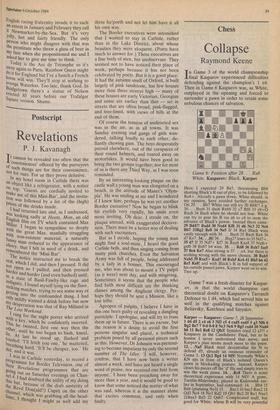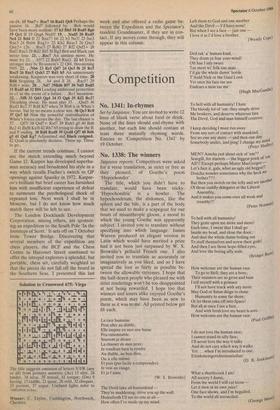Chess
Collapse
Raymond Keene
Tn Game 3 of the world championship final Kasparov • experienced difficulties defending against the champion's 1 e4. Then in Game 6 Kasparov was, as White, outplayed in the opening and forced to surrender a pawn in order to retain some nebulous chances of salvation.
Game 6: Position after 28. . . Ra8 White, Kasparov: Black, Karpov Here I expected 29 Be5, threatening Bb8 shutting Black's R out of play, to be followed by Re8+ . Already a pawn down, White should, in my opinion, have avoided further exchanges. On 29. . . Bb7 White can still try 30 Bb8!? e.g. 30.. . Bxc6 31 dxc6 Rxb8 32 c7 Rf8 33 c8=0 Rxc8 34 Bxc8 when he should not lose. White can try to post his B via a6 to c4 to stem the advance of Black's pawns. Instead there came: 29 Bd4?! Bxd4 30 Nxd4 Kf8 31 d6 Nc3 32 Nc6 Bb7 33Bg2 Re8 34 Ne5 If 34 Ral Black wins easily enough with 34. . . Bxc6 35 Bxc6 Re6 36 d7 Ke7. 34. . .16! 34. . .Bxg2? loses to 35 Nd7+. 35d7 If 35 Nd7+ Kf7 36 'Rxe8 Kxe8 37 Nxf6+ gxf6 38 Bxb7 b4 wins. 35. . . Rd8 36 Bxb7 fxe5 37 Bc6 Ke7 Also strong is 37. . .e4, but there is nothing wrong with the move chosen. 38 Bxb5 Nxb5 39 Rxe5 + Kxd7 40 Rxb5 Kc6 41 Rh5 h6 42 Re5 Ra8! and with Black's R in full support of his outside passed pawn, Karpov went on to win. Two up.
Game 7 was a fresh disaster for Kaspar- ov, in that the world champion cast theoretical doubt on Kasparov's Tarrasch Defence to 1 d4, which had served him so well in the qualifying matches against Beliavsky, Korchnoi and Smyslov.
Karpov — Kasparov: Game 7, 28 September. 1 d4 d5 2 c4 e6 3 Nf3 c5 4 cxd5 exd5 5 g3 Nf6 6 Bg2 Be7 7 0-0 0-0 8 Nc3 Nc6 9 Bg5 cxd4 10 Nxd4 h6 11 Be3 Re8 12 Qb3! Symslov tried 12 a3?! v Kasparov in the Candidates' Final, but to be honest I never understood that move, and Karpov's plan seems much more to the point. 12. . .Na5 Black must decentralise his N to defend d5, already an ominous reminder of Game 3. 13 Qc2 Bg4 14 NB! Normally White's KN sits in front of Black's isolated Queen's pawn in blockading posture. Instead, Karpov clears his pieces off the 'd' file and simply tries to win the weak pawn. 14.. .RcS There is scant theoretical experience with 14 Nf5! A game, Tseitlin-Malevinsky, played in Kislovodsk ear- lier in September, had continued: 14. . .Bb4 15 Bd4 (planning Ne3) 15. . .Bxc3 16 bxc3 Rxe2 18 Qd3 l's1c4 18 Ne3 Rd2 19 Qb1 Be2 20 Re 1 Nxe3 21Bxe3 BO 22 Qxb7. Complicated stuff, but good for White, whose B will be very powerful
on d4. 15 Nxe7+ Rxe7 16 Radl Qe8 Perhaps the passive 16. . .Rd7 followed by. . .Be6 would have been more resilent. 17 h3 Bh5 18 Bxd5 Bg6 19 Qcl If 19 Qxg6 Nxd5! 19. . .Nxd5 20 Rxd5 Nc4 21 Bd4 If 21 Bxa7? b6 22 b3 Ne3! 23 fxe3 Rxe3 24 Bxb6 Rxg3+ 25 Kh2 Rexc3 26 Qxc3 Qxe2+ (26. . .Rxc3 27 Rd8) 27 Rf2 Qxf2+ 28 Bxf2 Rxc3 29 Rd2 Bf5 30 Bg3 Be6 and Black can never lose. 21. . .Rec7 An aimless move. He must try 21. . .b5!? 22 Rxb5 Rxe2. 22 b3 Even stronger may be Bronstein's 22 0f4, threatening Nb5. 22. . .Nb6 23 Re5 Qd7 24 Qe3 f6 25 Rc5 Rxc5 26 Bxc5 Qxh3 27 Rdl h5 An unnecessary weakening. Kasparov was very short of time. 28 Rd4 Stopping 28. . .h4 and if 28. . .Rxc5? 29 Rd8+ wins. 28. . .Nd7 29Bd6 Bf7 30 Nd5 Bxd5 31 Rxd5 a6 32 Bf4 Lending additional protection to cl in the event of a future. . .Rcl incursion.
32.. 33 Qd3 Qg4 34 f3 Qg6 35 Kf2 Rc2? Thrashing about. He must play 35. . .Qxd3 36 Rxd3 Rc2 37 Rd8 Kf7 when 38 Rb8 is in White's favour, but by no means a clear win. 36 Qe3 Rc8 37 Qe7 b5 Now the powerful centralisation of White's forces carries the day. The last chance is 37. . .017! 38 Qxf7+ Kxf7 39 Rxh5 g5 40 Bd6 Rc2 41 Bxf8 Kxf8 42 Rh7 b5 trying to draw the R and P ending. 38 Rd8 Rxd8 39 Qxd8 Qf7 40 Bd6 g5 41 Qa8 Kg7 Adjourned and Black resigned. 42 Qxa6 is absolutely decisive. Three up. Three to go.
If the current trends continue, I cannot see the match extending much beyond Game 12. Karpov has developed superhu- man accuracy and broadened his style in a way which recalls Fischer's switch to OP openings against Spassky in 1972. Kaspar- ov's brilliant but brief career has furnished him with insufficient experience of defeat to surmount the psychological shock of repeated loss. Next week I shall be in Moscow, but I do not know how much match there will be left to see.
The London Docklands Development Corporation, among others, are sponsor- ing an expedition to the South Pole 'In the footsteps of Scott.' It sets off on 7 October from Tower Bridge. Discovering that several members of the expedition are chess players, the BCF and the Chess Centre in Harcourt Street combined to offer the intrepid explorers a splendid, but portable, chess set, carefully weighted so that the pieces do not fall off the board in the Southern Seas. I presented this last week and also offered a radio game be- tween the Expedition and the Spectator's resident Grandmaster, if they are in con- tact. If any moves come through, they will appear in this column.















































 Previous page
Previous page